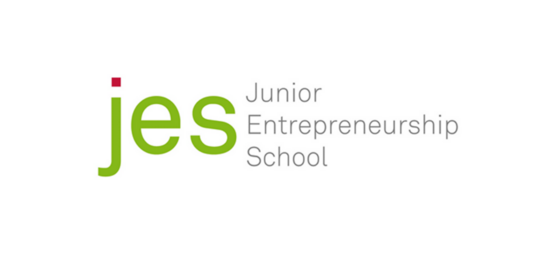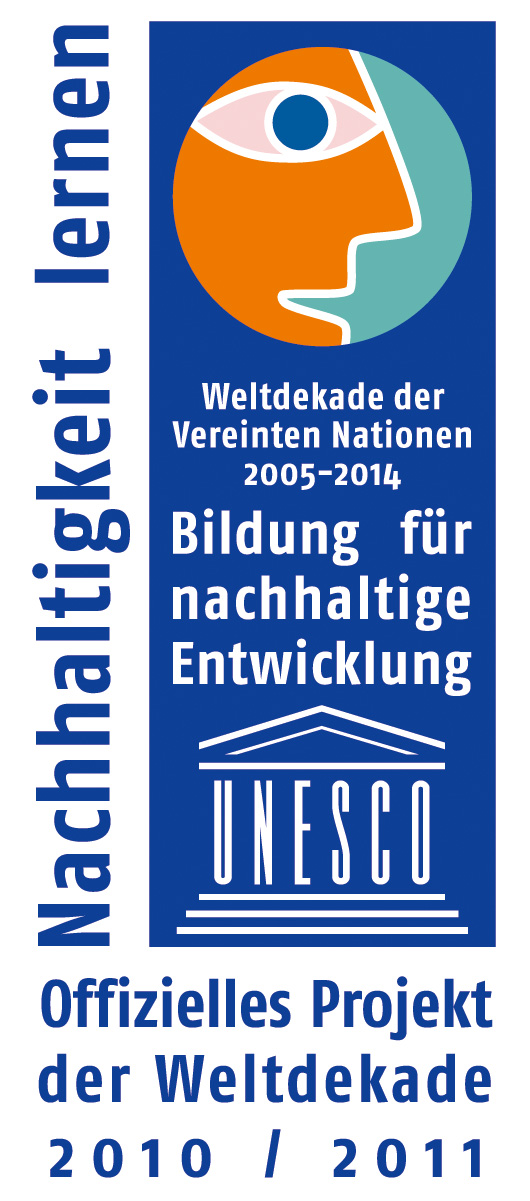Junior Entrepreneurship School

Mission
In view of the economization of our society and the associated implications for society and the environment, the challenge arises to establish economic education under the primacy of sustainability. This contributes to ensuring a sustainable and livable society.
Therefore, the Junior Entrepreneurship School aims at advancing the integration of economic education in general education schools, taking into account social and ecological aspects. For this purpose, partner schools have been recruited, where pulils of the upper-secondary level are specifically introduced to vocational practice and study-relevant economic content, and where personal responsibility and social commitment are promoted.
One of the key elements of the Junior Entrepreneurship School is the energy simulation game "Climate Protection & Consumers", which aims to raise the awareness of economically and ecologically responsible behavior in one's own household. In this way, the pupils learn in a playful manner what options they themselves have for dealing with energy rationally and thus managing it sustainably.
The long-term goal of the model project is to operate nationwide in the future in order to sustainably strengthen the socio-economic education of future generations.
Awards

German UNESCO Commission honors Junior Business School
The German UNESCO Commission has honored the Junior Business School (JBS) of TU Dortmund University as an official project of the UN World Decade of Education for Sustainable Development. The award is given to actions that implement the concerns of this worldwide educational offensive of the United Nations in an exemplary manner: The JBS brings economic education closer to schoolchildren through sustainable thinking and action. The awards were presented at an event in the Gelsenkirchen Science Park on July 1.
"The Junior Business School does exemplary work. The JBS imparts knowledge and skills for the sustainable development of our society and it provides the tools to find answers to important questions about the future," (translated) said Prof. Gerhard de Haan, Chairman of the National Committee of the UN Decade in Germany and member of the jury.
Professor Andreas Liening and Ewald Mittelstädt from the Department of Economics and Economic Education developed the JBS concept, which teaches basic economic knowledge to high school students individually and flexibly through the use of digital media. The core of the JBS is the energy simulation game Climate Protection & Consumers, which aims to raise awareness for economically and ecologically responsible behavior in one's own household. In this way, the students learn in a playful way what options they themselves have for dealing with energy rationally and thus managing it sustainably. "It is important to us that the learners become self-confident and creative citizens who not only engage in a variety of economic activities, but also take on responsibility for the environment and society in an active and self-organized manner," (translated) affirms Sabrina Zardini, research assistant and currently in charge of implementation at the Gesamtschule Hattingen. For students, the JBS is also good preparation for the changing world of work: "We would also like to deepen our business knowledge and hope to improve our training opportunities with the certificates," (translated) report the students.
The students are accompanied by a tutor. Till Sender, a student assistant and tutor himself, says, "We're available as contact persons at all times and are on site at the school twice a month with the group." (translated) This concept is expected to benefit the students when they apply for jobs or go to university later on.
UN Decade of Education for Sustainable Development
Sustainable development only works if everyone is committed to a humane society. Education for Sustainable Development teaches the necessary skills - such as teamwork and interdisciplinary thinking. Where do I buy clothes without supporting exploitation in Asia or Africa? How do we promote economic progress without destroying the environment? These are just two of the questions that Education for Sustainable Development answers. With the UN Decade of Education for Sustainable Development, the states of the United Nations have committed themselves to anchoring this kind of learning in their education systems. Based on a unanimous decision of the German Bundestag, the German Commission for UNESCO coordinates the German activities for the UN Decade of Education for Sustainable Development. It has appointed a national committee and set up a Decade Coordination Office with funding from the Federal Ministry of Education and Research.
A jury of experts decides which educational projects receive awards. The prerequisite is that the work must be aligned with the principles of education for sustainable development. The projects must impart knowledge and skills in at least two of the three sustainability dimensions - economic, social and environmental. Also important: The projects must be innovative in nature, have a broad impact and seek to cooperate with other projects.
The Junior Business School is an initiative honored by the DIHK, Otto Wolff Foundation and Wirtschaftswoche.
In 2006 - just one year after the launch of the pilot project - the Junior Business School attracted national attention.
In Berlin, in the presence of the State Secretary of the Federal Ministry of Education, the initiative was awarded the Initiative Prize for Training and Further Education 2006 by the DIHK, the Otto Wolff Foundation and Wirtschaftswoche.
Excerpt from the laudation, 06.11.2006
"The initiative "Junior Business School (JBS)" of the University of Dortmund with the project partner, the Martin-Luther-King Gesamtschule, shows in an exemplary way how the topic "economy" can be brought into general education schools. The Dortmund "JBS" addresses students of the upper secondary school level. How do I get orders as a self-employed person, how many can I create in which period of time? The 16-year-olds deal with all these questions both playfully and seriously. Board games, online learning and practical workshops are designed to whet the youngsters' appetite for entrepreneurship. In this way, the preparation for a commercial apprenticeship or business studies succeeds at an early stage. Personal responsibility and a willingness to perform are also encouraged." (translated)
Project partner
- iLearning GmbH (since 2005) - Dortmund
- Martin-Luther-King-Gesamtschule (since 2005) - Dortmund Dorstfeld
- Gesamtschule Hattingen (since 2007)
- Immaunel-Kant-Gymnasium (since 2007/2008) - Heiligenhaus




